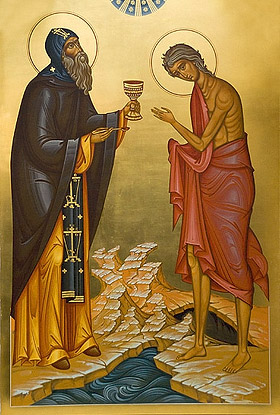 During the services of [the sixth] week, and to a still greater extent during Holy Week, the Triodion assumes the character of a historical narrative. Day by day we accompany Christ: we are with Him as He draws near to Jerusalem, as He reaches Bethany to raise Lazarus, as He enters the Holy City on Palm Sunday, as He approaches His Passion. The daily offices are marked by a sense of advancing movement and dramatic realism. Each day we call to mind, as exactly as possible, the things that must have occurred on the corresponding day during the last year of Christ's earthly ministry.
During the services of [the sixth] week, and to a still greater extent during Holy Week, the Triodion assumes the character of a historical narrative. Day by day we accompany Christ: we are with Him as He draws near to Jerusalem, as He reaches Bethany to raise Lazarus, as He enters the Holy City on Palm Sunday, as He approaches His Passion. The daily offices are marked by a sense of advancing movement and dramatic realism. Each day we call to mind, as exactly as possible, the things that must have occurred on the corresponding day during the last year of Christ's earthly ministry.
All this is not to be seen merely as a bare commemoration of occurrences in the distant past. On the contrary, through the liturgical celebration we relive these events, participating in them as contemporaries. We are raised from the level of secular time, as measured by the clock or calendar, to the level of 'liturgical' or 'sacred' time; we are transferred to the point where the vertical dimension of eternity breaks into linear time. This transposition of past into present, of remembrance into reality, is expressed in the liturgical texts above all through the word Today. So we sing on the Saturday of Lazarus, 'Today Bethany proclaims beforehand the Resurrection of Christ.' 'Today Christ enters the Holy City', we affirm on Palm Sunday. 'Today Christ comes to the house of the Pharisee', we state on Holy Wednesday, 'and the sinful woman draws near and falls down at His feet...Today Judas makes a covenant with the chief priests.' 'Today the Master of Creation stands before Pilate', we say on Great Friday: '...Today He who hung the earth upon the waters is hung upon the Cross.' So also Pascha Midnight we affirm: 'Yesterday I was buried with Thee, O Christ, and today I rise with Thine Arising. Yesterday I was crucified with Thee...'.
We shall not understand the meaning of these last two weeks in the Triodion unless we listen to this word Today that resounds at each service. It is not a mere metaphor or an instance of poetic license, but embodies a specific spiritual experience. All that was witnessed by the crowds in Holy Week, all the words addressed to the disciples, all the sufferings undergone by Christ - these are all to be experienced here and now by me.
- From The Lenten Triodion, "The Meaning of the Great Fast", Metropolitan Kallistos (Ware)
